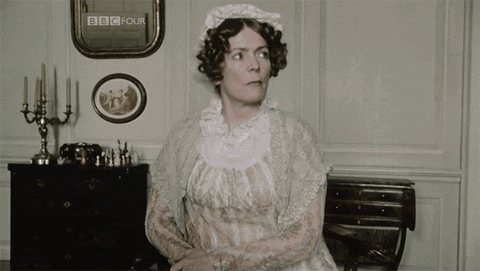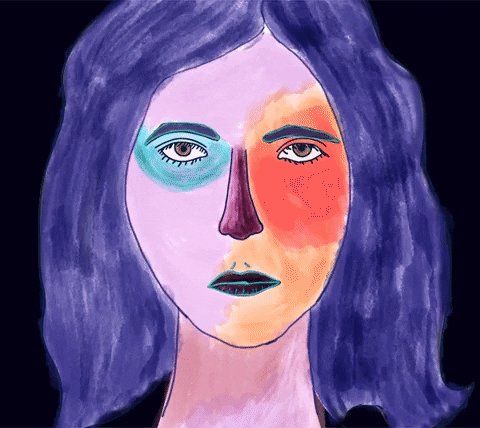The Internet Personified: I re-read Pride & Prejudice and changed my mind about one of the main characters
I've been re-reading Jane Austen this past week and a half. I only have The Collected Works, which is a large paperback copy, squinty little font, so you can't lie down and read, the best you can do is propped up against a pillow. I don't know why all collected Jane Austens have this tiny font, I suppose it is to fit all seven books into one volume, but it adds to the old-fashioned-ness of the thing. You are very aware you are reading a classic, the language is dated: he "staid" instead of "stayed," they lie on the "sopha," she does not "chuse" to return his letter. That sort of thing. I think Jane would be more accessible to readers, if you wanted to make her accessible, if the publishers updated that font a bit, maybe put the Collected Works into a two volume set. Oh, I know there are all sorts of beautiful copies of the individual books floating about, but everyone needs a Collected Works, so they can read all the way through.
On the other hand, the power of Jane is that even now, two hundred years after she lived, across continents, across worlds she probably couldn't even fathom, everyone knows her writing intimately, this woman who confined herself to writing about the drawing rooms she found herself in. You may not think she's important (who are you and why do you read this newsletter by another woman who writes about the world she finds herself in?) but you cannot ignore the impact she has had on the world.
Okay, that done, I'm getting to the meat and bones of this, which is my beloved Pride and Prejudice. [I began with Sense and Sensibility which I hadn't actually read before, that and Persuasion are both to be tackled on this read]. Like all of you, I have certain well formed opinions about the characters in P&P, which are:
1) Miss Bingley and Mrs Bennet are the worst.
2) Elizabeth is the best.
3) Darcy is dreamy.
4) Bingley seems a Nice Guy, with not much to say for himself, but an overall impression of Nice.
5) Poor Charlotte Lucas.
Upon re-reading though, I am beginning to revise my opinions on some of the characters, but most surprisingly, on Mrs Bennet.
Now, Austen sort of wants us to hate Mrs Bennet. You can tell by the dialogue she's given, she mewls and vapours and exaggerates. I mean, who could love such a woman? Certainly not her husband, we're told that quite clearly: he was fooled by her youth and good looks, not her children, except for the youngest, perhaps, a person of such monstrous selfishness that it's hard to think of Lydia loving anyone besides herself. Her siblings? Nope, there's the brother, Mr Gardiner, who is sort of ashamed of his sister, the other sister, Mrs Lucas who is about as silly as Mrs Bennet, but they don't hang out much. Take this woman, then: five daughters, one husband, two siblings, and no one loves her. Isn't that sad?

If Mr Bennet was fooled by youth and good looks, could Mrs Bennet have been any less gullible? I'm assuming no one warned her about the fact that her new husband's home was entailed away from her offspring, besides, at that point, she might have been confident in having a son. But, she's given five daughters instead, five daughters to marry off and ensure the welfare of. Is Mr Bennet interested in the matrimonial prospects of his daughters considering he doesn't have that much money? He is not. Instead he mocks and stymies her every chance he gets, not in the least interested in whether his kids will get to live comfortably after he dies. (In Austen's time, it is assumed that the only way to live a good life is to marry into it.)
Which brings me to Charlotte Lucas. I was always a little sorry for her, here she is, age 27 and forced to marry a man who is ODIOUS. But on re-reading, I realised that Charlotte had not done so differently as anyone with an arranged marriage would: she picked a man who could support her, and who, presumably, she does not hate. She doesn't love him, sure, and she might be embarrassed by him, but she likes the life they have together, her little cottage and the hens, and she can tolerate the man and make him a good wife. We can't all have Darcys. (I did some idle wondering about their sex life, but I'm sure it was about as earnest as Mr Collins himself.)
Speaking of Darcy, I know, I know, great passion, great speeches. But the problems he outlines at the beginning of the book regarding her connections: her parents, the fact that her brother-in-law is the man he hates most in the world, the connection to a poor country parson, who is basically his aunt's servant, those problems aren't going to go away, despite all of Elizabeth's flashing repartee and hot body. What happens next? What happens when Mrs Bennet, after the death of Mr Bennet, has to go live with one or the other of her daughters, because the man she married has failed to provide her a permanent home? At least we know, since Jane has spelt it out, that Mrs Bennet does not love Elizabeth, likes her least of all her children, so probably she'd spend most of her time with Jane and Bingley.
It's funny that Austen names the eldest daughter after herself: Jane, meek and mild and lovely, always willing to believe the best of everyone, and yet, if you imagine Austen, you're more likely to think of an Elizabeth type person. Someone smart and energetic and full of life. But Austen herself never married, despite writing all these love stories, I wonder if Jane was the Jane she wanted to be, placidly drifting through life without complaints.
Did any of you also think of P&P while reading A Suitable Boy? There's the two sisters and the silly mother, and the marriage looming over it all, even though Vikram Seth is kinder to Mrs Rupa Mehra than Austen is to Mrs Bennet. She may have been a silly woman but in the end, she was perhaps the only practical member of that entire family.
This fortnight in stuff I wrote
Mythology column this time got infested by trolls pissed off that I was talking about Holi in any way that wasn't "Happy Holi!" Please read to see what all the fuss is about:
The standard theory is that Holika was an evil villainous woman who would have enjoyed watching Prahlada burn, but there's no evidence supporting this. Let's say you were a maiden aunt (no mention of her husband and children, so safe to say she's either unmarried or widowed), living with your brother who you already know is kind of psycho, not to mention all powerful. He's so sociopathic, he's tried to kill his own kid a hundred times. If this same brother told you to jump into a pyre with your nephew, what choice would you have?
This fortnight in poetry
I found this poem I loved so much that I'm reproducing it here in full:
The Art Of Disappearing by Naomi Shihab Nye
When they say Don't I know you?
say no.
When they invite you to the party
remember what parties are like
before answering.
Someone telling you in a loud voice
they once wrote a poem.
Greasy sausage balls on a paper plate.
Then reply.
If they say We should get together
say why?
It's not that you don't love them anymore.
You're trying to remember something
too important to forget.
Trees. The monastery bell at twilight.
Tell them you have a new project.
It will never be finished.
When someone recognizes you in a grocery store
nod briefly and become a cabbage.
When someone you haven't seen in ten years
appears at the door,
don't start singing him all your new songs.
You will never catch up.
Walk around feeling like a leaf.
Know you could tumble any second.
Then decide what to do with your time.

This fortnight's somewhat shorter-than-usual link list
Yup, people are still writing about why some people don't want babies and I'm still linking to those pieces!
Reproductive desire seems like a big subject to have been bypassed by researchers. Perhaps there’s a simple explanation: For most of human history, people — women especially — haven’t had a choice about whether they wanted to become parents. Maybe it was easiest to assume that everyone simply wanted a baby. But as birthrates decline in every developed country, it’s clear that’s not the case.
Nora Roberts basically built herself a town.
For her most devoted fans, a pilgrimage to the bookstore and Boonsboro is almost de rigueur. “It’s just like our husbands taking a hunting trip or fishing trip. This is something we get to do, come down and visit Nora!” Debra LeBeaux, a grey-haired woman in a sweatshirt emblazoned with Roberts’s official logo and who has come to Boonsboro by her estimate “at least 20 times,” told me. At Turn the Page, you can buy everything from, naturally, books by Roberts and JD Robb (the pen name Roberts uses to write her In Death crime thrillers set in a New York City of the 2050s and ’60s) to coffee mugs and tote bags to jewelry inspired by her books and worn by her book’s characters. A sample: Simone’s necklace from the 2018 novel Shelter in Place, a sterling silver circle surrounding a brass heart ($29); Iona’s Copper Amulet, a clay replica of the one “forged by Sorcha” in Dark Witch ($15); Annika’s Mermaid Earrings, “Great for that special beach time!”
I'm having surgery to remove my gigantic fibroid babies (I will not miss them) this month and so obviously I read an article about people who wake up during anaesthesia because I am stupid.
It should have been a routine procedure, but, for reasons that are far from clear, the general anaesthetic failed. Rather than lying in peaceful oblivion, she woke up just before the surgeon made the first cut into her abdomen. With her body still paralysed by the anaesthetic drugs, she was unable to signal that anything was wrong.
Whatever happened to Fan BingBing, China's biggest superstar?
Under Xi’s crackdown, tens of thousands of people have disappeared into the maw of the police state. An eminent TV news anchor was taken away hours before going on air. A retired professor with views critical of the government was dragged away during a live interview on Voice of America. A billionaire was abducted from his private quarters in the Four Seasons in Hong Kong. Other high-profile disappearances include Interpol president Meng Hongwei in September, photojournalist Lu Guang in November, two Canadians who went missing in December, as well as the writer Yang Hengjun, who went missing in January. “The message being sent out is that nobody is too tall, too big, too famous, too pretty, too whatever,” said Steve Tsang, who runs the China Institute at the School of Oriental and African Studies at the University of London.
Until I write again. I remain, yours most faithfully,
m
Where am I? The Internet Personified! A mostly weekly collection of things I did/thought/read/saw that week.
Who are you? Meenakshi Reddy Madhavan, writer of internet words (and other things) author of seven books (support me by buying a book!) and general city-potter-er.
Follow me on Twitter, Facebook and Instagram.
Got sent this newsletter? Sign up here to subscribe!
Forward to your friends if you liked this and to the unbearable forward march of summer if you didn't.

